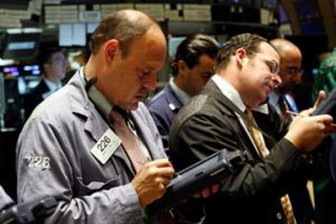 NEW YORK (Reuters) – U.S. stocks and the euro rose on Thursday but remained pressured by comments from top Republican lawmaker John Boehner, who indicated no substantive progress in the last two weeks in talks to reach a U.S. budget deal.
NEW YORK (Reuters) – U.S. stocks and the euro rose on Thursday but remained pressured by comments from top Republican lawmaker John Boehner, who indicated no substantive progress in the last two weeks in talks to reach a U.S. budget deal.
Boehner, the speaker of the U.S. House of Representatives, said he had no idea what compromises President Barack Obama was prepared to make on spending cuts.
Boehner’s comments rattled investors, who had earlier driven a leading world stock index to a three-week high alongside a rally in the euro and commodities. Major U.S. indexes went negative to little changed before investors began betting rhetoric will not prevent a deal.
Hopes remain high that U.S. political leaders will reach a deal to avert $600 billion in spending cuts and tax hikes that some economists believe could tip the world’s biggest economy back into recession.
“When the sentiment is that nothing is going to get done, it does create a lot of anxiety and selling pressure. If there’s any sense of progress, then the market seems to rally,” said Eric Kuby, chief investment officer at North Star Investment Management in Chicago. “I think we’re hostage to this for the rest of the year.”
The “fiscal cliff” is the biggest risk facing global markets in the final weeks of the year, following an agreement earlier this week on fresh aid for Greece.
The Dow Jones industrial average (.DJI) ended up 36.71 points, or 0.28 percent, at 13,021.82. The Standard & Poor’s 500 Index (.SPX) was up 6.02 points, or 0.43 percent, at 1,415.95. The Nasdaq Composite Index (.IXIC) was up 20.25 points, or 0.68 percent, at 3,012.03.
The MSCI global equities index <.MIWD00000PUS> was up 0.9 percent at 332.34, after earlier touching its highest level since November 7.
The FTSE Eurofirst 300 index (.FTEU3) finished up 1.1 percent, with the close of European stock markets almost coinciding with Boehner’s comments. It was the highest close for the benchmark European index since July 2011. Mining stocks, which are seen as among the riskiest equity sectors because they are more sensitive to changes in economic sentiment, were the best performers.
Good demand at a bond sale by Italy, where yields fell to their lowest level in two years, added to signs the crisis in the euro area has begun to ease and helped bolster optimism early in the global day.
Traders said until a deal was reached in Washington, share markets were likely to remain skittish.
U.S. government debt prices rose on safe-haven demand from investors who were rattled about the progress of budget talks in Washington.
The benchmark 10-year U.S. Treasury note was up 4/32, the yield at 1.6182 percent.
“There is very little conviction with all the political headlines,” said Carl Lantz, chief U.S. interest rate strategist at Credit Suisse in New York.
RISK FLOWS CHANGE
Safe-haven German government bonds fell as investors returned to riskier assets before Boehner’s comments, leaving benchmark 10-year debt yields at 1.37 percent.
The better tone allowed Italy to auction successfully six billion euros of new five- and 10-year debt, which was expected to complete its funding needs for the year. The yield on the 10-year bond was around the lowest since November 2010.
Spain announced it would sell more bonds at an auction on December 5, although it has completed raising all the money it needs for this year.
Italian and Spanish debt have benefited in recent months from the European Central Bank’s pledge to buy sovereign debt if countries ask for aid first. Although that has not yet happened,
the prospect of a central bank backstop has made investors reluctant to sell and has pushed them back into those markets.
A fall in Italian and Spanish yields helped lift the euro 0.2 percent against the dollar to $1.2974, with hopes for a U.S. fiscal deal adding to support for the common currency.
Commodity markets also got some support from the U.S. fiscal deal hopes, while mounting tension in the Middle East bolstered oil prices on supply concerns. U.S. crude oil futures rose $1.33 to $87.92 a barrel and Brent climbed $1.04 to $110.55 a barrel.
Spot gold was up 0.4 percent at $1,725.80 an ounce, after a 1.3 percent tumble on Wednesday, the biggest daily decline in nearly four weeks.
(Reporting by Nick Olivari; Additional reporting by Richard Leong, Rodrigo Campos and Ed Krudy in New York and Richard Hubbard, Marc Jones, Jon Hopklins and William James in London; Editing by Dan Grebler)
Source: Reuters



























